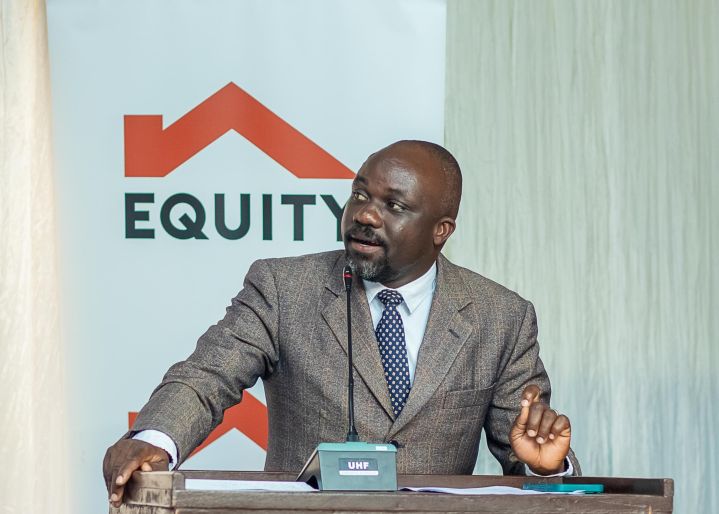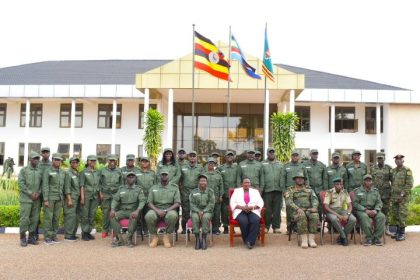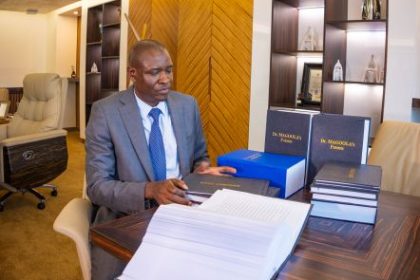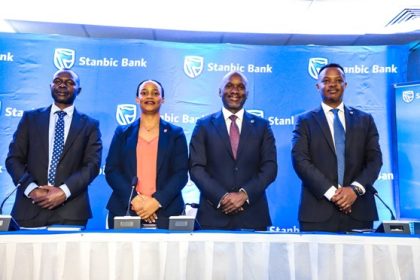Equity Bank extends SME support drive to Arua
 Draecabo Trinity Ceasar, Chairperson of the Ayivu Development Agency delivering the key note speech.
Draecabo Trinity Ceasar, Chairperson of the Ayivu Development Agency delivering the key note speech.
Equity Bank Uganda has pledged stronger support to small and medium-sized enterprises (SMEs) in the West Nile region, as it rolled out its Tupange Business Ne Equity series to Arua on Thursday. The engagement, held under the theme “Financing Integrated Value Chains and SME Growth,” brought together entrepreneurs, community leaders, and business partners to explore opportunities for expansion and innovation.
Welcoming participants, Charles Orodriyo, the Branch Manager of Equity Bank Arua, said the initiative was a continuation of Equity’s vision of transforming lives and societies through financial empowerment.
“At Equity Bank, we want to transform lives and communities. I encourage entrepreneurs in Arua to embrace change and grow both in their businesses and in their personal lives,” Orodriyo said.
Delivering the executive address on behalf of the Executive Director, Robert Wanok, Head of Retail Banking, underscored the bank’s Pan-African outlook through its Africa Recovery and Resilience Plan. He explained that Equity operates on a three-pillar model of commercial banking, social impact through the Equity Foundation, and sustainability.
Wanok highlighted agriculture, mining, manufacturing, trade and MSMEs as priority sectors for Uganda’s economic transformation. He stressed that Equity remains committed to empowering SMEs with tailored digital and credit solutions to unlock growth across regional trade corridors.
On a lighter note, Peter Ssemakalu, Regional Manager for Business Growth and Development, drew on a Northern Uganda saying: “A goat can feed a family, but only if it does not eat your crops.” He likened this to SMEs, explaining that businesses with the right guidance and financial support can generate value, profit and jobs without becoming burdens to their owners.
The keynote address was delivered by Draecabo Trinity Ceasar, Chairperson of the Ayivu Development Agency. He urged entrepreneurs to build long-term relationships with financial institutions, likening consistent engagement with banks to a child’s daily Bible reading as a pathway to growth.
“If SMEs want to grow, they must engage with their bankers regularly. Pay attention to detail, manage resources carefully, commit to learning, and seek the right partners for sustainable success,” Ceasar advised.
A panel discussion highlighted persistent barriers to SME growth in West Nile, including reliance on raw produce sales with little value addition, informality and poor record-keeping that limit access to finance, and weak market linkages. Despite the region’s large potential market—boosted by its refugee-hosting communities—many producers struggle to scale up. Speakers encouraged value chain integration, financial literacy and stronger business partnerships as solutions.
Equity Bank showcased a suite of tailored SME financial products, including Easy Stock Financing for retailers and distributors, Grain Trader Financing for aggregators, Easy Float Financing for mobile money agents, Asset and Vehicle Financing for businesses needing equipment, and unsecured credit for contractors and suppliers with valid contracts or purchase orders.
The event concluded with the SME Awards 2025, where outstanding clients in the Greater North were recognized. Madi West-Nile Diocese received the SME Business Influencer Award, Cress Africa Foundation Limited won the SME Customer Loyalty Award, and Kuluva Hospital was honored with the SME Ecosystem Customer Award.


 Government reaffirms commitment to capitalise UDB as Bank deepens development finance role
Government reaffirms commitment to capitalise UDB as Bank deepens development finance role
 Uganda’s DEI Biopharma gene therapy breakthrough could transform sickle cell treatment
Uganda’s DEI Biopharma gene therapy breakthrough could transform sickle cell treatment
 Equity Bank Uganda set to close 2025 on firmer footing as clean-up phase gives way to growth
Equity Bank Uganda set to close 2025 on firmer footing as clean-up phase gives way to growth
 Stanbic targets wider access to affordable financing with ‘Oli In Charge’ campaign
Stanbic targets wider access to affordable financing with ‘Oli In Charge’ campaign
 USA–Canada certification dispute could expose Uganda and regional airlines to regulatory risk
USA–Canada certification dispute could expose Uganda and regional airlines to regulatory risk
 Sumsub launches AI Agent Verification as Africa grapples with surge in AI-driven fraud
Sumsub launches AI Agent Verification as Africa grapples with surge in AI-driven fraud